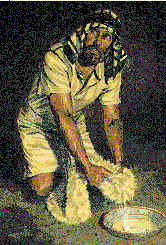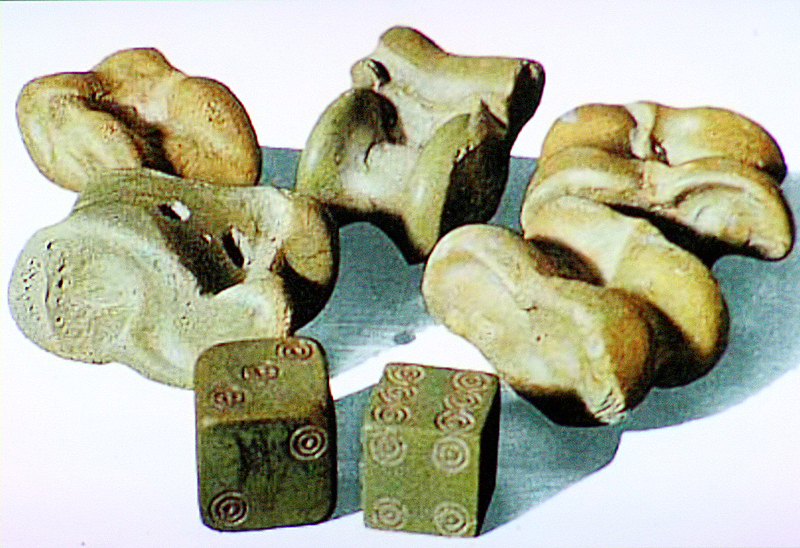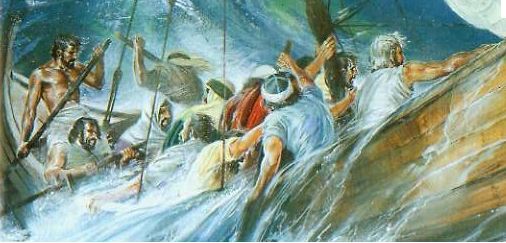Proverbs 16:33
Proverbs 16:33 (see also Proverbs 29:26; Acts 1:26)
The lot is cast into the lap, but its every decision is from the LORD.
One member of The Society of Evangelical Arminians: “In Old Testament times, believers would often seek God’s will by casting lots. Lots were typically small stones (or other types of markers) used to determine God’s selection of someone or something out of 2 or more possibilities. We don’t know the specific procedure for certain, but it would have been something like asking a yes or no question, and then throwing the lot, which would indicate the answer by what lot came out of the pouch that held them (there would be more than one lot, which would be marked or colored to distinguish them and their meaning) or something along these lines. This was a main method of seeking God’s will. So the proverb promises that in this procedure of seeking God, the lot’s every decision was from the Lord. So commentator Derek Kidner articulates the meaning of the proverb well: ‘The Old Testament use of the word lot shows that this proverb (and 18:18) is not about God’s control of all random occurrences, but about His settling of matters properly referred to Him’ (Proverbs, p.122). So this proverb is promising us that when we seek the Lord’s will, he will guide us. We don’t cast lots in the NT because we have the Spirit. We have a much more intimate relationship with the Lord. But the same principle still applies. When we truly seek the Lord’s will, he will guide us (compare the wonderful and famous Proverbs 3:5-6 -- ‘Trust in the LORD with all your heart and do not lean on your own understanding. In all your ways acknowledge Him, And He will make your paths straight.’) Now to take this passage in a deterministic sense does not make much sense in my opinion. This would require taking it to say that God accomplishes all that happens. So according to the deterministic reading, God is the one who accomplishes every wicked and evil thing that happens. That would mean that God accomplishes every sin, every rape, every child molestation. That’s practically blasphemy concerning the one whose eyes are too pure to look upon evil.”
One member of The Society of Evangelical Arminians: “Gideon
putting the fleece out is an example of this, since he did follow
through with God’s directions to cut down the size of the Army
that assembled to him. In fact, the reason why he reversed the
phenomena he prayed for, was due to poor protocol design: he
had no idea what a fleece would normally do to reliably detect
when God reversed the normal order of things, but he did know
that the normal order of things don’t reverse themselves on their
own. God cooperated with Gideon because He saw Gideon’s
commitment to following through on his vow, and just wanted
to make sure that he did not misread God.”
The Old Testament contains several examples of lots being used, which was necessary for direction, since the Holy Spirit had not yet been given (at least, not yet in the New Testament sense). For instance, land assignments in Canaan were determined by lot. Detection of the sinner, Achan, was identified by lot. The punishment against the tribe of Benjamin was determined by lot. Essentially, people were seeking direction from God in situations for which they had no other way to discern truth. When the lot was used obediently, the action expressed commitment to do as God willed. The method of the lot itself was not a point of emphasis, but rather, trust in God was the emphasis, who gives wisdom and controls the outcome. This makes the flavor of Proverbs 16:33 very similar to Proverbs 29:26, which states: “Many seek the ruler’s favor, but justice for man comes from the LORD.”
Numbers 26:52-55: “Then the LORD spoke to Moses, saying, ‘Among these the land shall be divided for an inheritance according to the number of names. To the larger group you shall increase their inheritance, and to the smaller group you shall diminish their inheritance; each shall be given their inheritance according to those who were numbered of them. But the land shall be divided by lot. They shall receive their inheritance according to the names of the tribes of their fathers.’”
Joshua 7:14: “In the morning then you shall come near by your tribes. And it shall be that the tribe which the LORD takes by lot shall come near by families, and the family which the LORD takes shall come near by households, and the household which the LORD takes shall come near man by man.”
Joshua 21:4: “Then the lot came out for the families of the Kohathites. And the sons of Aaron the priest, who were of the Levites, received thirteen cities by lot from the tribe of Judah and from the tribe of the Simeonites and from the tribe of Benjamin.”
Judges 20:9-10: “But now this is the thing which we will do to Gibeah; we will go up against it by lot. And we will take 10 men out of 100 throughout the tribes of Israel, and 100 out of 1,000, and 1,000 out of 10,000 to supply food for the people, that when they come to Gibeah of Benjamin, they may punish them for all the disgraceful acts that they have committed in Israel.”
In the New Testament, there is an instance at Acts 1:26 of lots being cast, in order to determine the replacement for the disciple Judas. However, this may not have been appropriate, and if there was a replacement disciple, it would appear to have been Saul of Tarsus, who later became known as the Apostle Paul. It must also be pointed out that the casting of lots was not limited to God’s people. The Roman soldiers cast lots for Jesus’ garments, and Jonah’s shipmates also cast lots, in order to determine from the deities who was responsible for the sea storm.
Jonah 1:6-7: “So the captain approached him
and said, ‘How is it that you are sleeping? Get
up, call on your god. Perhaps your god will be
concerned about us so that we will not perish.’
Each man said to his mate, ‘Come, let us cast
lots so we may learn on whose account this
calamity has struck us.’ So they cast lots and
the lot fell on Jonah.”
One thing that Proverbs 16:33 does not appear to mean, is that every decision on earth is from the Lord. Rather, every decision of the lot, and which are cast in inquiry to the Lord, are what is determined by Him. Some Calvinists seek to use this text as a proof-text that God determines all decisions whatsoever, but that appears to go beyond the intent of the text, and beyond reason itself, since some things of chance, and their corresponding answers, come from the very opposite of God, such as the Ouija board.
What Christian would wish to say that its answers are determined by God? So there is a context here.
Here is an article for more on this subject.


